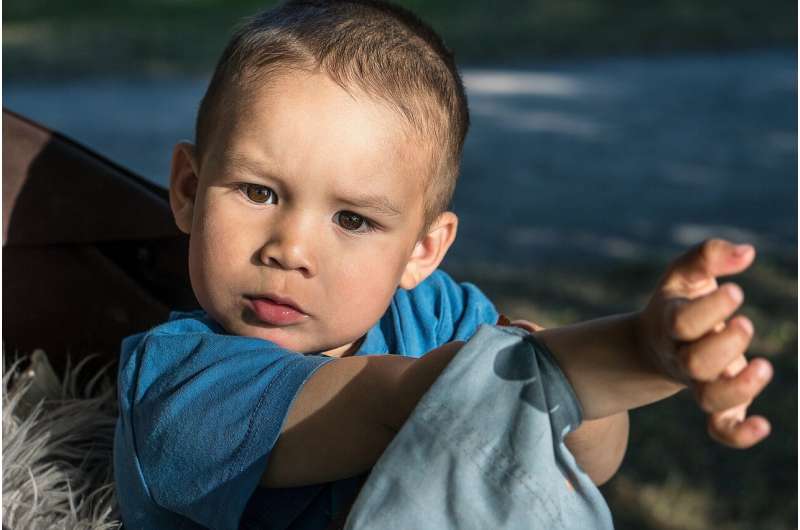This article has been reviewed according to Science X's editorial process and policies. Editors have highlighted the following attributes while ensuring the content's credibility:
fact-checked
peer-reviewed publication
trusted source
proofread
Early behavioral health problems need earlier interventions, says study

A six-year study that analyzed data from a 25-question screening tool found alarming evidence of unhealthy behavioral trajectories starting as early as age two among families affected by low income and other social stressors.
Findings from the study led by Robert Ammerman, Ph.D., and colleagues at Cincinnati Children's were published Oct. 16, 2023, in JAMA Pediatrics.
Experts may not be surprised by another study reporting an association between family stress and child behavioral problems. However, the early ages of onset and severity of behavioral problems were unexpected. Importantly, the ability of a 10-minute screening test to detect higher-risk groups of children suggests that practical tools may already be available to help experts target limited intervention resources toward those most in need.
"The elevated results we saw reflect significant behavioral problems starting at very early ages," Ammerman says. "The findings suggest that we cannot afford to wait until children enter school or reach their teen years to intervene. Our field needs to focus much more intently on prevention."
Rx: Population-level action PLUS earlier individual care
The research team administered a well-established screening tool called the Strengths and Difficulties Questionnaire (SDQ) to 15,218 children during annual well-child visits that occurred at three primary care offices and three school-based care clinics.
The questions were answered by the caregivers, mostly mothers, who reported whether their children were more likely than others to exhibit various behaviors. Questions addressed fighting, temper tantrums, fearfulness, excessive fidgeting, willingness to help others, avoiding other children, and more.
The study focused on the overall frequency of reported problems rather than the specific type of behaviors. The team looked at the association of reported problems with a set of other information about the family, such as the mother's mental health status and whether any of several known social determinants of health were present.
Caregivers reported significant behavior problems among 34% of the children screened. The research team further identified "trajectory groups" based on whether behavior problems decreased or increased with age. Those with increasing trajectories were more likely to be male, publicly insured (Medicaid), have a caregiver with depression, or live in a family with other social needs.
Recognizing the importance of these early trajectories, the pediatric practices have implemented the new Integrated Behavioral Health Program at Cincinnati Children's. That program provides psychologists who meet directly with families during well child visits to recommend steps parents can take at home and evaluate children who may need more intensive support.
"Screening for behavior problems in primary care has been recommended since 2015 by the American Academy of Pediatrics but only some practices are routinely doing this," Ammerman says. "We also understand that many pediatric primary care practices do not have a mental or behavioral health professional working in the office."
That's why—until care resources are dramatically expanded across the country—the early steps for addressing behavioral health risks need to focus more on preventive interventions to promote healthy behavioral development.
"It is important to remove or reduce as many of the stresses that are negatively affecting early childhood development as possible," says Robert Kahn, MD, MPH, director of the Michael Fisher Child Health Equity Center at Cincinnati Children's and a study co-author. "We know that children are less likely to begin exhibiting behavioral disorders when they have safe housing and enough nutritious food to eat. We know that depression among new mothers can be effectively treated, which in turn can greatly benefit the mental health of the child. If more children and families are safe, they are less likely to need hard-to-obtain professional services."
Ammerman says it's important for more pediatric practices to screen for child behavior problems even if there are not as many services available for referrals as they might like to see.
"Pediatricians are frequently the first, sometimes the only trusted person to hear about behavioral health concerns before children reach school age," he says. "They are very busy but taking this time can provide an opportunity to intervene before behavior problems elevate into more serious and harder-to-treat diagnoses later."
Next steps: Longer-term analysis
Cincinnati Children's plans to expand its tracking of SDQ data in children up to age 12. Different screening tools would be used for teens and for those under age two, Ammerman says. Over time, the data will help evaluate which types of inventions have the most benefit and when they should be applied.
Meanwhile, data like this will further inform a large-scale mental health trajectories research project underway at Cincinnati Children's. That effort, led by researchers John Pestian, Ph.D., and Tracy Glauser, MD, involves using one of the nation's most powerful supercomputers to train an artificial intelligence software platform that can rapidly analyze many types of patient data to produce mental health "growth charts." These reports would help clinicians identify at-risk children at significantly earlier stages than current practices.
Cincinnati Children's has a long track record of supporting child development needs beyond its hospital walls, including years of collaboration with legal aid and child welfare agencies, home visiting programs for new mothers, and more.
Experts here say integrated behavioral health is a particularly promising approach for expanding access to needed care and support. The recently announced Mental and Behavioral Health Institute at Cincinnati Children's plans to accelerate expansion of integrated behavioral health services into community-based pediatric practices.
"We want to develop and test a variety of early-intervention strategies," Ammerman says. "Ideally, we can produce an entire menu of programs that professionals throughout our region and across the country can employ to help children at risk of behavioral disorders, but we are not there yet."
More information: Behavior Problems in Low-Income Young Children Screened in Pediatric Primary Care, JAMA Pediatrics (2023). DOI: 10.1001/jamapediatrics.2023.4229


















